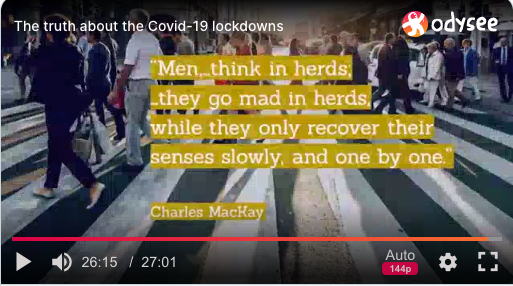Father Philip Silhouan Thompson, “Two Blind Men Teach Us to Pray”
Every monk whose spiritual practice has borne fruit, whatever his age, is called “a beautiful elder.” —Olivier Clément, quoted
HT @JohnBrady
I recommend highly that one reads Johnny Vedmore’s “Schwab Family Values”—Vera Sharav
One day he walks to Bethany, where the sisters Martha and Mary welcome him to their home. Sc. 57, Luke 10:38
There seems to be no particular reason for Jesus to visit Martha and Mary, besides his liking them.
France had no desire to be a republic, but it had a fixed and resolute aversion to the Old Regime. —Hazen, Modern Europe, p. 157
Thomas Dunn, (1947–2023) RIP.
For years we tried to go to his bakery in Canastota on our way to Syracuse. They were always closed, having sold all their baked goods in the morning before we got there.
It is worth a very careful search into the Old Testament, as men call it, to see if it is possible anywhere to find therein a prayer of anybody who addresses God as Father. For up to the present, although I have searched according to my ability, I have not found one. —Origen, “On Prayer”
One might wonder if Adam & Eve had “full knowledge” & “full consent of the will”. One might even wonder if they committed a Mortal Sin. Considering the aftermath, how important is our judgment of their culpability?
Ordering a BLT at McCarroll’s in Latham, NY.

Feeling is the appropriate arbiter. —Jacques Barzun
Feeling is the appropriate arbiter. All reasoning about what is right, civilized and moral rests upon sentiment. Only, in trying to persuade others, it is important to single out the fundamental feeling, the prime intuition, and from it to reason justly. —Barzun, “In Favor of Capital Punishment”
Nick Hudson, The Truth about the COVID-19 Lockdowns

To see ourselves as others see us is a rare and valuable gift, without a doubt. But in international relations what is still rarer and far more useful is to see others as they see themselves. —Barzun
Faith supported the non-juring clergy, the state supported the juring – and the state embarked on a long, gloomy, and unsuccessful struggle to impose its will in a sphere in which it did not belong. —Hazen, Modern Europe, p. 150
Jerome's translation of Origen's On the First Principles
In the introduction to his translation, Rufinus implied that Jerome was a follower of Origen. Jerome was so incensed that he produced his own translation. Jerome’s translation has been lost in its entirety. Origen, in Wikipedia
Saul and Balaam and Caiaphas prophesied; the sons of Seæva in the Acts of the Apostles were seen to cast out dæmons; and Judas with the soul of a traitor is related to have wrought many signs among the other Apostles. —Jerome
The Declaration of the Rights of Man was a statement of the rights which belong to men because they are human beings, which are not the gift of any government. —Hazen, Modern Europe, p. 140
F: That is not the “gotcha” that you think it is. I have not. “The statute books are full of laws, of which the Sherman Act is a good example, that effectively authorize courts to create new lines of law.”
W: Does the text say that? Does it have a “delegation to judges to develop new law” clause?
F: Well, no.
—Evan D. Bernick, “Beyond Law?: A Socratic Dialogue Inspired by Baude’s ‘Beyond Textualism?'"